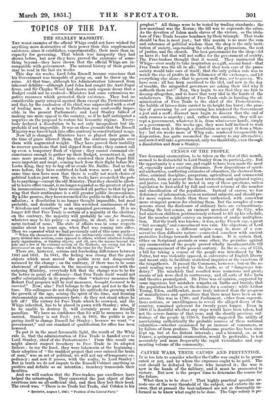CENSUS OF THE PEOPLE.
THE decennial enumeration, to be taken on the 31st of this month, seemed to be distasteful to Lord Stanley from its particid-rity. But the opportunity is a rare one, and ought to have been made the most of, especially under existing dilemmas. New dispositions of spirit- ual authorities, conflicting estimates of education, the electoral fran- chise, criminal discipline, pauperism, agricultural and commercial interests, form at present the most interesting and agitated topics ; and justice can hardly be meted in any of these questions, unless legislation be first aided by full and correct returns of the number and classification of the population. Instead of excess, we fear deficiency of information, even on national subjects, and should pre- fer more copious details than those authorized, with somewhat more stringent powers for eliciting them. But the scruples of some persons about the disclosure of ordinary facts are extraordinary. Pending the last census, an eminent merchant of the City, who had nineteen children, pertinaciously refused to fill up his schedule, lest the number might convey an impression of undue multiplica- tion. But the truth was known; it was, as the French say, a great "fait accompli," and concealment was vain. The objections of Lord Stanley may have a different origin—may be more of a con- servative than diffusive nature—connected somehow with ancient protective feelings towards hearth and home. It is certain that, either on Scriptural grounds or some other, the prejudice against any enumeration of the people proved wholly insurmountable till the commencement of the present century. In the gez.,ion of 1753, a bill for taking a census of the people was introduced by Mr. Potter, but was violently opposed, as subversive of English liberty and meant only to facilitate statistical inquiries or the exactions of the taxgatherer. It passed the Commons, however ; but on the se- cond reading was rejected by the Lords, as of " dangerous ten- dency." The mischiefs that resulted were numerous and great ; oceans of ink were shed in controversy, and all sorts of false facts and theories promulgated. Dr. Price was of opinion, supported by some ingenious but mistaken remarks on births and burials, that the population had been on the decline for a century ; while Arthur Young, Eden, andllowlett, more truly inferred from the progress of manufactures and agriculture that there must have been an in- crease. This was in 1780; and Parliament, either from supersti- tious notions, or unwillingness to reveal the alleged decay of the country, remained quiescent for twenty years longer. Even in 1800 it is doubtful whether any steps would have been taken, had not the severe famine of that year, and the shortly previous suf- ferings of the people in 1795-6, forcibly suggested the utility of ascertaining authentically the probable sources of these national calamities—whether occasioned by an increase of consumers, or by failure of farm produce. The wholesome practice has been since kept up, but at too distant intervals ; and a biennial, or, as in France, a quinquennial enumeration, would be preferable, to test accurately and more frequently the rapid vicissitudes and aug- menting volume of the community.


























 Previous page
Previous page